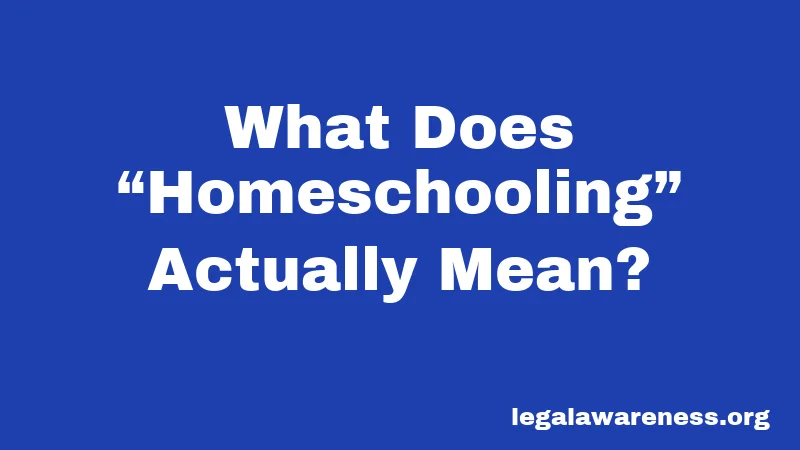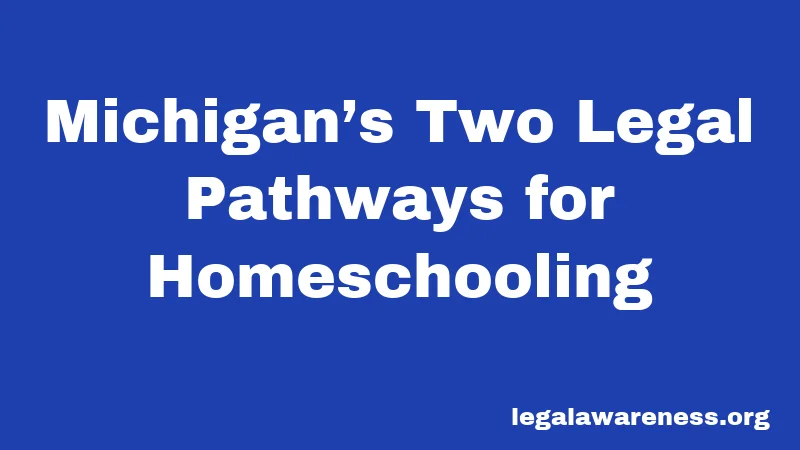Michigan Homeschool Laws in 2026: The Parent’s Straightforward Guide
Most people have no idea how easy Michigan makes it to homeschool. Seriously. If you’re thinking about teaching your kids at home, you’re lucky to be in the Mitten State. Michigan is what educators call a “low regulation” state—which basically means the government trusts parents to do the right thing.
Here’s the thing: homeschooling in Michigan is so simple that it might surprise you. No waiting months for approval. No paperwork piling up. No mandatory testing. Just you, your kids, and a solid education plan. Let’s break down exactly what Michigan law says you need to do.
What Does “Homeschooling” Actually Mean?

Okay, pause. This is important because Michigan’s definition is pretty specific.
Homeschooling in Michigan means your child gets educated at home by you (their parent or legal guardian) in an organized educational program. Sound simple? It is. But “organized” does matter—you can’t just let your kid watch YouTube all day and call it school.
The key part? You have to be the parent or guardian teaching your own child in your home. You can’t educate someone else’s child and call it homeschooling. That’s an important distinction that confuses people sometimes.
How Old Does Your Child Need to Be?
Children in Michigan must attend some kind of school from age 6 to 18. But here’s where it gets good: you can choose to homeschool instead of traditional public school. That’s where you have options.
If your child turned 11 before December 1, 2009, they attend school until age 16 (unless their school district has newer rules). If your child turned 11 on or after December 1, 2009, or entered sixth grade in 2009 or later, school is required until age 18.
Michigan’s Two Legal Pathways for Homeschooling

Ready for the best part? You have two completely different ways to homeschool legally in Michigan.
Option 1: The Homeschool Statute (Exemption F)
This is the path most people choose, and honestly, it’s probably the simplest approach.
Under Michigan’s homeschool statute, you educate your child at home without notifying anyone. No paperwork. No approval needed. You don’t even have to tell your school district you’re pulling your kid out (though many families do, just to avoid confusion down the road).
Here’s what you do need to teach: reading, spelling, mathematics, science, history, civics, literature, writing, and English grammar. That’s it. These are the essential subjects.
You are not required to hold a teaching certificate. You don’t need a college degree. You don’t need any special qualifications. The law literally puts the responsibility on you to make sure your child learns these subjects in an organized way.
No specific hours are mandated. No number of school days required. Public schools? They’re stuck with 180 days and 1,098 hours annually. You? You have freedom to structure it however works for your family.
That’s basically the whole requirement under Option 1.
Option 2: Nonpublic School Registration
This option has more structure. You’d be operating your homeschool as a state-approved nonpublic school.
With this pathway, you do need to notify your local school superintendent annually. You also need either a certified teacher, a teacher with a permit, or someone with a bachelor’s degree doing the instruction.
The required subjects are slightly broader here: mathematics, reading, English, science, and social studies in every grade. High school students also need instruction in the U.S. Constitution, Michigan Constitution, and the history and present form of government.
So why would someone choose Option 2? Usually because they want to hire someone else to teach their child, or they want their homeschool officially recognized as a nonpublic school. Some families like the extra structure. Others need it to access certain resources or special education services.
Here’s the thing: most families choose Option 1. It’s the path of less bureaucracy.
What About Record-Keeping?
Not sure what counts as “organized”? Here’s what makes sense.
You’re not required by law to keep detailed attendance records if you go with Option 1. However—and this is big—it’s smart to keep records anyway.
Think of it like a safety net. If a school official ever questions whether your child is actually getting an education, records prove it. Plus, you’ll need them for college applications and to show what your child accomplished.
Here’s what experts recommend you keep:
A portfolio showing what your student completed each year across all the essential subjects. Notes on textbooks, workbooks, and lesson plans you used. Test scores if you’ve given your child any assessments. Copies of correspondence with your school district (if you have any).
Basically, keep anything that shows your child is learning. You’re building a picture of their education.
Curriculum: What Can You Use?

Honestly, this is one of the coolest parts about Michigan homeschooling. You have complete freedom.
You can use a boxed curriculum you buy online. You can use free resources from Khan Academy or YouTube. You can hire a tutor. You can do a mix of everything. You can teach science in your backyard. You can teach history through road trips.
As long as you cover those essential subjects—reading, spelling, math, science, history, civics, literature, writing, and English grammar—you’re good. There’s no state-approved curriculum requirement. No mandated textbooks.
This flexibility is what draws a lot of families to Michigan homeschooling. You design the education that works for your kid, not the other way around.
Do You Have to Do Standardized Testing?
Nope. Not required.
Michigan doesn’t mandate standardized testing for homeschoolers. Zero requirement. None.
That said, plenty of families do choose to test their kids. Why? Sometimes for their own peace of mind. Sometimes to build stronger college applications. Sometimes to track progress.
If your child does take standardized tests—like the SAT, ACT, or MAP Growth—those scores stay with your child individually. They’re not reported to the state. They’re for your own records.
The interesting part? Michigan public schools get free SAT testing. You can contact your local school district and ask if homeschoolers can participate in free testing too. Some districts say yes. It’s worth asking.
What About Graduation and Diplomas?
Wait, it gets even better.
There are literally no state-mandated graduation requirements for homeschoolers in Michigan. You decide when your child graduates. You issue the diploma yourself.
Some parents graduate their kids at traditional high school age. Others do it earlier or later based on how their child learns. Some create their own graduation ceremony. Others keep it simple.
If you want guidance, you could look at what Michigan public schools require—stuff like four years of English, three years of social studies, and so on. But you’re not bound by those requirements.
You literally get to define what it means for your child to “graduate.”
Pretty cool, right?
Accessing College and Advanced Programs
Colleges love homeschoolers. Seriously.
Most universities—including Michigan schools like University of Michigan and Michigan State—accept applications from homeschooled students. They understand that homeschoolers often have non-traditional transcripts.
Here’s what you should do: create a transcript documenting your student’s courses, grades, and achievements. Include standardized test scores if you have them. Get recommendation letters from people who’ve worked with your child (tutors, co-op teachers, mentors). Build a portfolio showing their best work.
The key is being organized and clear about what your child learned.
One thing to know: if your child wants to participate in nonessential elective classes at the public school—like band, art, drama, or AP courses—you might be able to arrange that. Policies vary by district, so contact your local school board to ask.
Special Education and Support Services
Here’s where it gets important. Can your homeschooled child get special education services?
If your child has an IEP (Individualized Education Plan) from when they attended public school, that doesn’t transfer to homeschooling. But there’s an option: a Nonpublic School Service Plan.
This is basically the homeschool version of an IEP. Your child can get eligible special education services from the public school while still being homeschooled. However, your homeschool has to be registered and approved by the Michigan Department of Education for this to work.
So if your child needs speech therapy, occupational therapy, or other services, you have a pathway. You just need to register as a nonpublic school first (Option 2).
If you’re unsure whether your child qualifies, contact your local school district. They can evaluate your child and determine what services they might need.
Important: Ages 16-18 Early Withdrawal Option
This deserves its own section because it surprises people.
If your child is 16 or older (and was born after December 1, 2009 or entered sixth grade in 2009 or later), you can actually get an exemption from school attendance altogether. You just need to notify your school district in writing that your child has permission to stop attending school.
This is different from homeschooling. This means no formal schooling at all. It’s an option some families use for work or other circumstances.
But if you’re homeschooling, you’re still required to provide organized instruction. This early withdrawal option is separate from homeschooling.
Sports and Activities: Can Homeschoolers Participate?
You’re wondering about sports and clubs, right? Good question.
Michigan’s policy varies by school district. Some districts allow homeschoolers to participate in school sports. Some don’t. Some allow certain activities but not others.
Here’s what you do: contact your local school district directly and ask. Explain that your child is homeschooled and you’d like to know about participation options. Different districts have different rules, so you can’t assume one answer covers your whole state.
What If You Change Your Mind?
Maybe you try homeschooling and it doesn’t work. Or your situation changes. Can you re-enroll in public school?
Yes, absolutely. There’s no penalty. No legal consequence. You simply re-enroll your child in public school and provide any records you’ve kept.
Same thing works the other direction. You can pull your child out of public school and start homeschooling anytime. The law allows it.
If You Choose to Register as a Nonpublic School
If you decide to go with Option 2 (registering as a nonpublic school), here’s what you need to know.
You have to notify your local school superintendent annually. You can request a form from your district or send a letter with this information: names and ages of all children, whether they attend a physical location or are taught at home, and names of the teachers.
You need someone with a teaching certificate, teaching permit, or bachelor’s degree doing the instruction. The religious exemption applies here too—if your religious beliefs object to certification requirements, you’re exempt.
After that, the superintendent generally leaves you alone. They can request academic records, but they won’t be breathing down your neck constantly.
Religious Objections to Teacher Certification
You might have seen this mentioned a few times. Let’s clarify.
If your homeschool is registered as a nonpublic school and you have sincere religious beliefs that object to teacher certification requirements, you don’t need a certified teacher. You don’t even need a bachelor’s degree.
This exception exists for families whose faith traditions prioritize parental authority in education. If this applies to your family, you’re exempt from the teaching qualification requirement.
Can You Homeschool Someone Else’s Child?
This comes up more than you’d think.
If you want to homeschool a friend’s child or a relative’s child, that’s different. You’d need to have legal guardianship or custody of that child. Otherwise, it’s not considered a legal homeschool arrangement in Michigan.
You can tutor someone else’s child or help with instruction. But that’s tutoring, not homeschooling. An important distinction.
Recent Changes and the Current State of Things
Michigan’s homeschool laws have been pretty stable since 1996. The compulsory attendance age shifted in 2010 (moving from 16 to 18 for certain students), but that’s the big legal change people remember.
Since then, Michigan has maintained this hands-off approach. There have been discussions about increasing oversight over the years, but nothing has actually changed the fundamental law. As of 2026, you still have the same freedoms your homeschooling friends had five years ago.
The state trusts parents. That’s the core philosophy.
How to Get Started Step-by-Step
Let’s keep this practical.
Step 1: Decide which pathway you want. Option 1 (homeschool statute) or Option 2 (nonpublic school)? Most people choose Option 1.
Step 2: If you choose Option 1, that’s really it. You can start immediately. No paperwork required.
Step 3: If you choose Option 2, contact your local school superintendent’s office and ask for the notification form. Fill it out and submit it annually.
Step 4: Gather any records from your child’s previous school if they attended public school. Transcripts, report cards, IEPs, anything helpful.
Step 5: Start planning your curriculum. What subjects will you cover? What resources will you use?
Step 6: Create a schedule. When will school happen? How will you structure each day?
Step 7: Keep records as you go. Portfolios, grades, work samples. You’ll need these eventually.
And honestly? That’s it. You’re homeschooling.
Frequently Asked Questions
Do I have to notify my school district if I start homeschooling?
Not legally required under Option 1 (homeschool statute). But many families do anyway to avoid confusion. If you choose Option 2 (nonpublic school), you must notify your superintendent annually.
Can I homeschool without any teaching experience or degree?
Yes, completely. Under Option 1, there are zero qualification requirements. You don’t need teaching experience, a college degree, or anything. You just have to teach the required subjects.
What if my child is behind in a subject?
That’s between you and your child. There are no state benchmarks or progress assessments required. You move at whatever pace works. Some subjects might take longer. That’s fine.
Are homeschooled transcripts accepted by colleges?
Yes. Colleges accept homeschooled students regularly. Create a clear transcript, include test scores, get recommendation letters, and build a portfolio. Colleges want to understand what your student accomplished.
Can my homeschooled child play sports in public school?
Maybe. It depends on your district. Contact your local school board and ask directly. Policies vary.
What happens if someone reports me to the school district for not homeschooling properly?
The burden is on the state to prove you’re not complying with the law. If you’re teaching the required subjects in an organized way, you’re fine. This is why keeping records helps—they show you’re following the law.
Do I need to follow the Michigan Merit Curriculum?
No. That’s for public schools. You’re not bound by it. Design your own curriculum or use whatever program you choose.
Can I use online schools instead of teaching myself?
Yes. Online schools, curriculum programs, tutors, co-ops—all of it counts. As long as your child learns the required subjects, you’re covered.
What’s the difference between homeschooling and hiring a tutor?
Homeschooling means you (the parent/guardian) are responsible for organizing the education. Tutoring is someone helping with specific subjects. You can do both, but homeschooling is the parent’s responsibility.
If I homeschool, can my child get access to special education services?
Only if your homeschool is registered as a nonpublic school (Option 2). Then you can get a Nonpublic School Service Plan for eligible services.
Final Thoughts
Michigan makes homeschooling easy because the state respects parental rights. There’s not a ton of red tape, not a lot of paperwork, and definitely not a lot of government intrusion.
That said, “easy” doesn’t mean “anything goes.” You still have to teach your kid. You still have to cover those essential subjects. You still have to be intentional about education.
The freedom Michigan gives you is a gift. Use it wisely.
Want more information? Check out the Michigan Department of Education’s nonpublic school page, talk to your local school district, or connect with local homeschool groups. Michigan has a strong homeschooling community, and other families are usually happy to share what they’ve learned.
You’ve got this.
References
Michigan Department of Education – Nonpublic & Home Schools
MCL 380.1561 – Compulsory Attendance Law
Michigan Christian Homeschool Network – Michigan Homeschool Law
Michigan Department of Education – Homeschooling in Michigan (PDF)
Home School Legal Defense Association – Michigan
U.S. Department of Education – Michigan Private School Regulations
